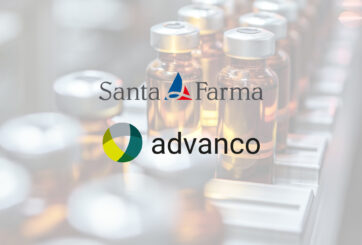The rising importance of ESG in the pharmaceutical sector
Environmental, social and governance (ESG) that we hear so much about today is a relatively new concept, taking shape in the mid-2000’s. However, it has fast become one of the most important agenda-items for virtually every company across the globe.

It is easy to see why ESG has become an essential action-point for firms. The overriding principles behind ESG are decades, even centuries old, but thanks to intense media coverage over recent times, we are all now acutely much more aware of the intense damage that has been done to the planet. The rise of influential pressure groups, and spokespeople such as Greta Thunberg for example, have informed us of the impact caused by practices such as intensive farming, the use of pesticides, over-fishing and de-forestation – just some of the culprits which have damaged the earth’s natural resources, sometimes beyond repair.
Against such a backdrop, businesses must be seen to be doing all they can to reduce the damage being done to the environment – with the pharmaceutical sector chief among these. This article explores how the sector is addressing ESG challenges and leveraging technology to drive meaningful change in its operations.
ESG and pharma – traditionally poles apart.
Traditionally, the pharmaceutical sector has had a bad reputation in terms of the damage caused to the environment from its manufacturing processes.
A staggering fact is that the global pharmaceutical industry is not only a significant contributor to global warming, but it also produces 13 per cent more carbon emissions making medicines than car manufacturers do while assembling their vehicles – despite having a market that is 28% smaller.
Furthermore, the issue of medications being released into the environment also causes huge issues. The UK’s Natural History Museum states that over 40% of the world’s rivers could contain harmful levels of drugs, which can damage ecosystems and interfere with the growth and behaviour of animals and plants. It argues that after entering the water through sewage systems, rainwater runoff and factory discharges, compounds including antidepressants, painkillers and antibiotics have been found to be exceeding safe limits in bodies of water around the world.
For a sector that provides the medicines needed to keep people healthy, figures such as these which show the sector is actively harming the planet are shocking.
How pharma can address ESG
The pharmaceutical sector, largely through recognising the damage that has been done in the past, is now committed to turning around its previous bad reputation.
One of its most high-profile actions is doing all it can to stamp out the issue of fake medicines and medical equipment. While the issue is an ongoing one, and has been so for many years, it has been brought to prominence once again during recent times due to many instances of fake Covid vaccines being distributed across the world.
One critically important piece of legislation is the 2030 Agenda for Sustainable Development, adopted by all United Nations Member States in 2015, which provides a shared blueprint for peace and prosperity for people and the planet, now and into the future. At its heart are the 17 Sustainable Development Goals (SDGs), which are an urgent call for action by all countries – developed and developing – in a global partnership. They recognize that ending poverty and other deprivations must go together with strategies that improve health and education, reduce inequality, and spur economic growth – all while tackling climate change and working to preserve our oceans and forests.
Advanco strongly believes that all firms should be familiar with its contents and should be doing all they can to adhere to them.
Indeed, we have already ensured that our solutions are playing a vital part in helping companies to meet the challenges of the Charter. For example, our track and trace systems help companies meet Sustainable Development Goal (SDG) 3: Good Health and Wellbeing, by allowing access to genuine, safe, quality, and affordable medicines and vaccines for all.
Furthermore, we believe that in the future, our products will enable companies to meet other Sustainable Development Goals (SDGs), such as SDG 2: Zero Hunger and SDG 12: Responsible Consumption and Production.
Tracking carbon emissions across the supply chain
Pharmaceutical companies can take steps to measure and track emissions data which will benefit multiple aspects of their business.
For example, by gaining a full overview of every single item of reusable packaging, drugs producers will theoretically be able to calculate the CO2 footprint per item, together with savings in packaging materials.
Expiry date tracking throughout the supply chain and dynamic expiry date calculations will also serve to reduce waste. There will also be less items being returned – with a corresponding reduction in the need to transport these returns, and less burning of all the fossil fuels this returns process usually demands.
And of course, one of the ultimate aims of track-and-trace is to reduce the volume and value of counterfeits. In addition to the biggest danger of all – potentially killing people and damaging the planet – the manufacture of fake products often breaches sustainable production and working conditions standards.
Technology is also a vital driver for the reduction of carbon emissions. The installation of open and modern IT Systems across the sector, especially in specific areas such astrack-and-trace and serialization, means there is a reduction in the amount of cumbersome infrastructure that is needed. This immediately reduces the amount of CO2 being directly produced from this equipment, plus there is less need for technicians to travel to routinely repair and service it.
Together with the introduction of this technology comes the implementation of CO2-efficient processes on the shopfloor, including predictive maintenance and better overall utilization of the specialist equipment.
Challenges in implementing ESG initiatives
Despite the pharmaceutical sector’s growing recognition of the importance of ESG initiatives, there are significant challenges in translating intentions into concrete actions. Several key challenges contribute to this gap.
One major obstacle to effective ESG implementation is the lack of full buy-in from top management and a corporate culture that may not prioritize sustainability. While there has been progress in raising awareness and enthusiasm for ESG goals, some decision-makers may still prioritize short-term financial gains over long-term sustainability
Another challenge lies in the inadequate allocation of resources, both in terms of expertise and technology, necessary for implementing sustainable practices. Many pharmaceutical companies may lack the necessary expertise in sustainability strategies or may not have access to the latest technologies that enable efficient tracking and reduction of environmental impacts
The pharmaceutical industry operates within highly complex supply chains, involving numerous stakeholders and intricate logistics. Implementing ESG initiatives across such supply chains requires coordination, collaboration, and sometimes, restructuring of existing processes. This complexity can hinder the swift adoption of sustainable practices.
Compliance with evolving regulatory frameworks and standards presents another challenge for pharmaceutical companies. Navigating the landscape of environmental regulations and ensuring compliance with ESG reporting requirements adds complexity to the implementation process, particularly for multinational corporations operating in diverse regulatory environments.
Pharmaceutical companies must address these challenges head-on. This requires not only commitment from top management but also investment in the necessary expertise, technology, and cultural transformation. Collaborative efforts within the industry, along with partnerships with external stakeholders and regulatory bodies, can facilitate the transition towards meaningful and impactful ESG implementation.
Conclusion
The pharmaceutical sector has traditionally had a bad reputation because of the environmental damage caused by its manufacturing processes, and through the damage done by the actual products it makes.
However, it is now working hard to shake off this sinister reputation – something that advanco applauds. As a sector, we pride ourselves on producing the medicines needed to enrich lives and save the lives of people across the globe.
It therefore stands to reason we need to save the planet we all live in – and the sector needs to work together to ensure this overriding goal is delivered for the good of everyone.
VIEW THE ORIGINAL ARTICLE HERE



